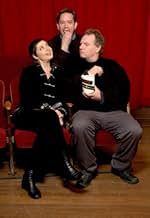Adicionar um enredo no seu idiomaA musical of sorts set in Winnipeg during the Great Depression, where a beer baroness organizes a contest to find the saddest music in the world. Musicians from around the world descend on t... Ler tudoA musical of sorts set in Winnipeg during the Great Depression, where a beer baroness organizes a contest to find the saddest music in the world. Musicians from around the world descend on the city to try and win the $25,000 prize.A musical of sorts set in Winnipeg during the Great Depression, where a beer baroness organizes a contest to find the saddest music in the world. Musicians from around the world descend on the city to try and win the $25,000 prize.
- Direção
- Roteiristas
- Artistas
- Prêmios
- 6 vitórias e 7 indicações no total
- American Mother
- (as Nancy Drake)
- Direção
- Roteiristas
- Elenco e equipe completos
- Produção, bilheteria e muito mais no IMDbPro
Avaliações em destaque
Set in 1933, "the depths of the Great Depression", the location is Winnipeg, Canada, home of Lady Port-Huntly (Isabella Rosselini), the astoundingly wealthy beer baroness of Canada, who decides to hold a contest to select the saddest music in the world--for business reasons, of course. Among the entrants are her former lover, Chester Kent (Mark McKinney), his current lover Narcissa (Maria de Medeiros), Chester's estranged brother Roderick (Ross McMillan)--separated from Narcissa, and the men's father, Duncan (Claude Dorge). Duncan represents Canada; Chester, America; and Roderick, Serbia (of all places).
The prize is $25,000, a fortune in those days, so naturally there are entrants from all over the world--among which are Mexico, Siam, and Africa. The music is inspired, but eventually converges on the lilting popular American tune The Song is You, for which there are diverse renditions in the course of the film. The show-stopper is the version by Chester near the end, a big band production that fuses influences, in typical American fashion, from all over the world.
Familial tensions converge with unrequited love, and with the most peculiar prostheses anyone has ever seen--either in real life or on film. Lady Port-Huntly is a double amputee, and he whose reckless mistake resulted in her unfortunate current condition fashions for her a pair of legs that must be seen to be believed.
The entire film is shot using a blue-haze filter, with a faux stereopticon effect that narrows the viewing screen to that resembling what one would see from the early days of film, and with the faintest, subtlest and tiniest of lags in action-speech synchronization that makes this uncannily resonate as a work fusing a 30s setting, a pre-20s style, and a contemporary sensibility that knows how to combine these elements in the first place. This is a truly brilliant--I would even call it genius--approach to filmmaking that noone else in the known world even remotely approaches. Maddin is one of the contemporary masters of cinema and this is the proof.
As soon as this is available on DVD, I will buy it immediately. I suggest you do the same.
The film might have been a collaboration between David Lynch, Orson Welles, Eisenstein, and the Brothers Quay - each of them disagreeing what the film should be about. It was worth trying. I quickly got used to the extremely smudgy effect - as if the lens had been smothered in vaseline - and I appreciated Isabella Rosselini (looking and sounding like her mother) and the big-eyed Maria de Madeiros.
The backdrop was a music contest between international contestants to find the world's saddest music. The face-off heats was pure Python but it was all kept strangely distant. There were several problems: the emotional drama between the father and the two sons was dreary, as such issues always are. Secondly, it wasn't funny, and that was because it was all art and no emotional intelligence. Thirdly, it said nothing. It was full of ideas, but they were all microscopic, worked out at scene level - or even frame level. The whole thing put together didn't add up to anything. In the end, the images were everything, and that is always going to be disappointing.
That's not to say the movie doesn't have its fair share of the absurd, the bizarre, and the dark (it *is* a Canadian film, after all). Lines are delivered with strange inflections, characters' motivations are screwy, filmic styles are mixed. None of these, however, comes off as pretentious or forced.
The film explores the interesting paradox that despite the reality and ubiquity of real sadness, authentic expressions of sadness are difficult and rare.
Winnipeg has been declared by the London Times `the world capital of sorrow' for the fourth year in a row. What happens in the film can be categorized as surrealism of the sort that marries the Melies brothers in their `Trip-to-the-Moon' wackiest to `The Twilight Zone' in Rod Serling's most hilarious (and that's pretty unusual) moments. Shot in distressed mode with 8 mm blown up to be grainy and silent movieish, `Saddest' has blue-grays and silvers and occasional bursts of washed-out color that give it an otherworldly cast meant to satirize the old movies and create a new look built on nostalgia and freedom from convention that some call expressionism.
Some of the bizarre acts vying for the prize are Fyodor (David Fox), a veteran of World War I representing Canada, who plays a deathlike version of ''The Red Maple Leaves'' on an upright piano he has turned over, and Indian singers in Eskimo costumes, who dance to ''California Here I Come'' with sitars and banjos commemorating a 19th-century kayaking accident. All the time an iris lens blurs the edges of the film to recreate the ancient look of film found in a vault after 50 years.
That Lady Port-Huntly needs artificial legs is not as bizarre as the back story of how she came to need them, and that the new glass legs have local beer coursing through them is just another creative and absurdist touch. With a resemblance to the robot in `Metropolis,' she is an amalgam of strange and prophetic moments in film and culture. I know I'm not making much sense here-Trust me that this film is bizarre enough to satisfy the geekiest cultist in our audience. For the rest of us, just trying to appreciate all the signposts Maddin constructs to further his absurd and funny vision is exhausting. Wordsworth's thoughts apply because we at least hear `the still, sad music of humanity.'
First off, Guy Maddin's films are an acquired taste. Second, it helps to be a film fan and to have a knowledge and love of early cinema to truly appreciate them. Third, you must be willing to give yourself over totally to his particular vision. Don't even try to fight it. Do all this and get ready to enjoy.
"The Saddest Music in the World " is a wonderful amalgam of comedy, drama,
tragedy and farce. It's got a cast of characters that are familiar and yet strange at the same time. Just when you think it's heading in one direction, it yanks you in another. It has an internal logic just like a dream.
The photography, art direction and sound design add to the uniqueness of the
experience. The film feels like an artifact, a lost film that was hidden away by a studio in the '30s because it was too wild and broke too many rules. In fact, it's film-making that defies the system.
The DVD contains a making of featurette that is enjoyable to watch. There are also 3 short films. Only Maddin could make a film with the title "Sissy Boy Slap Party" and make it funny.
Please take a chance and rent/buy this film. It's not the typical Hollywood
product (although it mines Hollywood's past) and for that we should be glad.
I also have to recommend another film by Guy Maddin- "Dracula: Pages from a
Virgin's Diary", a silent film ballet. I got it sight unseen and love it. The director's commentary was worth the price alone.
I'm a Guy Maddin fan. I have developed an addiction for his work. Thank God!
Você sabia?
- CuriosidadesSome actors are given an "additional camera" credit, as they shot footage on handheld Super8 cameras.
- Citações
Lady Port-Huntley: If you are sad and like beer, I'm your lady.
- Trilhas sonorasThe Song is You
Music by Jerome Kern
Lyrics by Oscar Hammerstein II
Used by permission of Universal - Polygram International Publishing, Inc.
Principais escolhas
- How long is The Saddest Music in the World?Fornecido pela Alexa
Detalhes
- Data de lançamento
- País de origem
- Idiomas
- Também conhecido como
- La canción más triste del mundo
- Locações de filme
- Empresas de produção
- Consulte mais créditos da empresa na IMDbPro
Bilheteria
- Orçamento
- CA$ 3.500.000 (estimativa)
- Faturamento bruto nos EUA e Canadá
- US$ 699.225
- Fim de semana de estreia nos EUA e Canadá
- US$ 37.743
- 2 de mai. de 2004
- Faturamento bruto mundial
- US$ 854.994
- Tempo de duração
- 1 h 40 min(100 min)
- Cor
- Mixagem de som
- Proporção
- 1.85 : 1
































